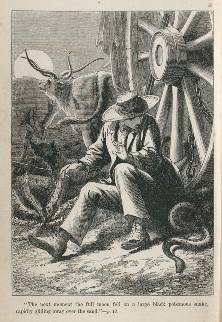Sunday School Books: Themes
By the 19th-century it becomes apparent that children are readers in their own right, with requirements different from adults. As the 19th-century progresses, more books are written specifically for children by being geared to their reading level and by using attractive themes and illustrations.
 |
| An illustration from The Wanderer in Africa, Catalogue #SS022. |
Sunday schools contributed to this trend by encouraging a rise in children's literature and literacy. This in turn affected the canon of Sunday school literature, which became more varied thematically, and thus more easily disseminated to a wider audience.
Thematically, the books in this collection are in keeping with Anglican Sunday school tenets, while being of a level of understanding and interest to children; themes and narrative styles include allegories, character studies, histories, missionary stories, and tales set in exotic locales. Books intended for older children include essays, memoirs, biographies, and religious discourses.
The books' contents, for all their charm, are not great works of literature. They were meant to encourage the development of good moral and personal traits, and were often stylistically severe, and made heavy use of such themes as initiative, honesty, sympathy, sincerity, courage, and self-control.
In a colonial context such as St. Andrews, the themes of hard-work, thrift, patriotism, and cleanliness would have been especially useful in the Sunday school lessons. The books also reassured the colonialists that they had a divine and social right to colonize an 'uncivilized' country.
Although the majority of the Sunday school books were written anonymously, most likely the majority were written by women authors. One such author was Jane Alice Sargant, who wrote, among other works, Shades of Character, #SS066, published by the SPCK. Like many authors, she had published many titles, both officially and unofficially. Best-seller authors such as Sargant were pirated on a regular basis by the American publishers. See #SS180 for an example.
